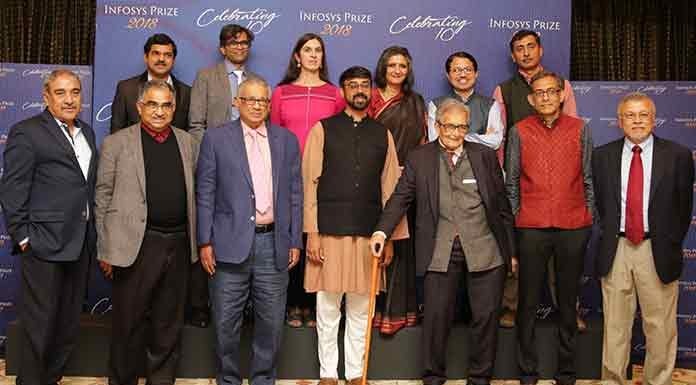The Infosys Science Foundation (ISF) announced the winners of the Infosys Prize 2018 at an awards ceremony in Bengaluru. The Infosys Prize is given to individuals who have made significant contributions across six fields, namely Engineering and Computer Science, Humanities, Life Sciences, Mathematical Sciences, Physical Sciences and Social Sciences.
Under the field, Engineering and Computer Science, Navakanta Bhat, Professor, Indian Institute of Science, Bangalore and Chairperson, Centre for Nano Science and Engineering, IISc won the award for his work on the design of novel biosensors based on his research in biochemistry and gaseous sensors that push the performance limits of existing metal-oxide sensors. Prof. Bhat has devised gas sensors with ultra-precise detection accuracies necessary for space and environmental monitoring, especially useful for India's growing space, atomic energy and security programs.
The award in humanities went to Kavita Singh, Professor and Dean, School of Arts & Aesthetics, Jawaharlal Nehru University, New Delhi for her extraordinarily illuminating study of Mughal, Rajput and Deccan art, as well as her insightful writing on the historical function and role of museums and their significance in the increasingly fraught and conflicted social world in which visual culture exists today. Prof. Singh's work shows the significance of museums in highlighting the social impact of art, and thereby relates visual culture to large contemporary questions of secularity, modernity, and political conflict, including the conflicts around repatriation that have been generated by a colonial past.
Under Life Sciences category, Roop Mallik, Professor, Department of Biological Sciences, Tata Institute of Fundamental Research, Mumbai won it for his pioneering work on molecular motor proteins, which are crucial for the functioning of living cells. Mallik has identified and measured forces needed to transport large particles inside cells, and demonstrated their role in fundamental processes like targeting pathogens for their destruction and moving lipid droplets for fatty acid regulation in the liver. Among other things, Prof. Mallik's research provides insights that will improve therapies for conditions such as obesity and diabetes.
In Mathematical Sciences, Nalini Anantharaman, Professor and Chair of Mathematics, Institute for Advanced Study, University of Strasbourg, France won it for her work related to “Quantum Chaos”, specifically for the effective use of entropy in the study of semiclassical limits of eigenstates in quantum analogs of chaotic dynamical systems and for her work on the delocalization of eigenfunctions on large regular graphs. Prof. Anantharaman's work impressively explores the deep relationship between classical and quantum systems and the unexpected use of entropy to prove some of the hard results.
S.K. Satheesh, Professor, Centre for Atmospheric & Oceanic Sciences, Indian Institute of Science, and Director, Divecha Centre for Climate Change was awarded under Physical Sciences category for his pioneering scientific work in the field of climate change. His studies on black carbon aerosols, the dark, light absorbing, microscopic particles in air which greatly influence the energy balance of the atmosphere over the Indian subcontinent, have enabled a better understanding of the role of these particles on climate change, precipitation, and, human health in the Indian subcontinent. Prof. Satheesh's work on measuring, quantifying, and analyzing the impact of black carbon aerosols is important to not only climate science but also to society that has to mitigate and cope with climate change, possibly the most important threat to humanity.
In Social Sciences, Sendhil Mullainathan, University Professor, Professor of Computation and Behavioral Science, and George C. Tiao Faculty Fellow, The University of Chicago Booth School of Business won it for his path-breaking work in behavioral economics. Mullainathan's research has had substantial impact on diverse fields such as development, public finance, corporate governance and policy design. A significant part of this work is relevant to India. He is currently working on big data and machine learning issues and applications in economics.
The winners were felicitated by the Chief Guest, Prof. Manjul Bhargava, Fields Medalist and R. Brandon Fradd Professor of Mathematics at Princeton University with a pure gold medal, a citation and a prize purse of USD 100,000. at Princeton University with a pure gold medal, a citation and a prize purse of USD 100,000.
The winners were chosen from 244 nominations by jurors headed by eminent academics: Prof. Pradeep K. Khosla (University of California, San Diego) for Engineering and Computer; Prof. Amartya Sen (Harvard University) for Humanities; Prof. Mriganka Sur (Massachusetts Institute of Technology) for Life Sciences; Prof. Srinivasa S. R. Varadhan (New York University) for Mathematical Sciences; Prof. Shrinivas Kulkarni (California Institute of Technology) for Physical Sciences; and Prof. Kaushik Basu (Cornell University and former SVP, World Bank) for Social Sciences.











